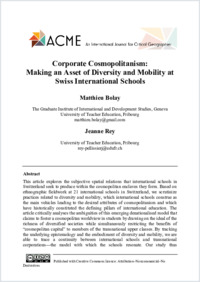Corporate Cosmopolitanism: Making an Asset of Diversity and Mobility at Swiss International Schools
HEP|PH FR
- Bolay, Matthieu HEP Fribourg / PH Freiburg
- Rey, Jeanne HEP Fribourg / PH Freiburg
-
2020
Published in:
- ACME: An International Journal for Critical Geographies. - 2020, vol. 19, no. 1, p. 106-130
English
This article explores the subjective spatial relations that international schools in Switzerland seek to produce within the cosmopolitan enclaves they form. Based on ethnographic fieldwork at 21 international schools in Switzerland, we scrutinize practices related to diversity and mobility, which international schools construe as the main vehicles leading to the desired attributes of cosmopolitanism and which have historically constituted the defining pillars of international education. The article critically analyses the ambiguities of this emerging denationalised model that claims to foster a cosmopolitan worldview in students by drawing on the ideal of the richness of diversified societies while simultaneously restricting the benefits of “cosmopolitan capital” to members of the transnational upper classes. By tracking the underlying epistemology and the embodiment of diversity and mobility, we are able to trace a continuity between international schools and transnational corporations—the model with which the schools resonate. Our study thus supplements analyses of cosmopolitan capital by focusing on how a flexible, corporate-inspired conception of cosmopolitanism is instilled from the earliest stages of education, thus shedding light on a paradoxical interplay of cosmopolitanism and space, wherein the praised capacity of international students to adapt to various settings goes hand in hand with their relative isolation from the local environment and its potential frictions.
- Faculty
- HEP|PH FR
- Language
-
- English
- Classification
- Education, teaching
- License
-
License undefined
- Identifiers
-
- RERO DOC 328494
- Persistent URL
- https://folia.unifr.ch/unifr/documents/312674
Statistics
Document views: 383
File downloads:
- Texte intégral: 388
